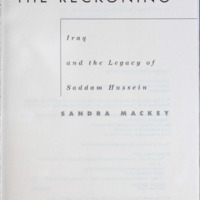-
Title
-
The reckoning : Iraq and the legacy of Saddam Hussein
-
Description
-
The reckoning is an account of the forces--historical, religious, ethnic, and political--that produced Saddam Hussein's dictatorship. Iraq was forged after World War I from the Mesopotamian region of the collapsed Ottoman Empire, and its people have never had a national identity or a sense of a common purpose. Hussein, ruling by terror, pitted the various ethnic groups, religious interests, and tribes against one another, and in so doing achieved the destruction of Iraq's middle class and civilized society. After he goes, the country could be the site of conflict even more vicious than the Balkan wars.
-
Identifier
-
1016726
-
393051412
-
Creator
-
Mackey, Sandra
-
Format
-
1st ed.
-
Source
-
Brian Lamb Booknotes Collection
-
Gift of Brian Lamb, 2011.
-
Catalog record
-
Language
-
eng
-
Date
-
2002
-
Program air date: July 7, 2002
-
Publisher
-
Norton
-
George Mason University. Libraries. Special Collections & Archives
-
Text
-
Transcript of Annotations
Front endpapers include notes regarding the author's connection with the Middle East, biographical information on the Prophet Muhammad, information regarding the size and age of the State of Iraq, and notes on the relationship of Britain with Iraq. -- The back flyleaf lists several events in chronological order that lead to the exile of the country's president Abd al-Rahman Arif in 1968. -- Notes on back endpapers include biographical information on Saddam Hussein and his two sons Uday and Qusay, and stress the importance of the oil boom for the country. Other notes refer to the setting of the boundaries of Iraq, Saudi Arabia and Kuwait by Sir Peter Cox in 1922 and outline the progression of the Gulf War in 1990. The notes end with these statements and questions: "Because helicopters could fly in Iraq after surrender, Hussein was able to put down Kurds' revolt in the North," - Saddam's butchery unfolded in private." -- "Why, when 80% of population in North and South revolted, did S.H. survive?" -- Annotations by Brian Lamb in the margins and underlining of pertinent phrases throughout the book. -- Examples: p. 12: "Hussein has crushed the Arabs' art form - conversation." -- p. 27: "In the end, the coalition that had so brilliantly fought the Gulf War had failed to achieve real victory in either a political or a humanitarian sense." -- p. 57: "Iraqis: Mesopotamian past is not important; defined as Arab through language; two form of Islam - orthodox Sunni Islam, dissenting Shia Islam." -- p. 396: "An invasion of Iraq has become almost a given in the unfolding war on terrorism." -- "The United States cannot wade unaware into Iraq as it once waded into Vietnam."
-
Subject
-
"Hussein, Saddam, 1937-2006."
-
Relation
-
Original Booknotes interview
-
Rights
-
This work may be protected by copyright laws and is provided for educational and research purposes only. Any infringing use may be subject to disciplinary action and/or civil or criminal liability as provided by law. If you believe that you are the rights-holder and object to Mason’s use of this image, please contact speccoll@gmu.edu.
 1016726.pdf
1016726.pdf